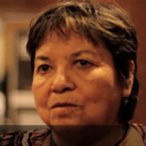Chile, interview about the Summit of the Peoples hold in Santiago

 8 de Enero, Radio Mundo Real.
8 de Enero, Radio Mundo Real.
The headquarters of the Chilean Workers Union (CUT), in Santiago, capital of Chile, was chosen to hold the press conference that the organizers of the Summit of the Peoples, to take place from January 25 to 27 in that city, carried out on Friday to make the public and open call to this event.
“We believe that where the presidents meet, where these important summits are held, our spaces are so or more important, because it is there where social movements, the peoples, are represented”, said Francisca Rodriguez, of the National Association of Rural and Indigenous Women of Chile (ANAMURI) and the Latin American Coordination of Rural Organizations (CLOC-Via Campesina) to Real World Radio.
The meeting will take place in the Urban Planning and Architecture School of the University of Chile, in parallel to the EU-CELAC Summit to take place in the same city.
Francisca, also known as “Pancha” was one of the speakers at the press conference held on Friday. The organizers of the Summit of the Peoples of Chile, the rest of Latin America and the Caribbean and Europe are over 120. They are social movements, organizations and networks who have been working for many years in these alternative building processes against the power of capital.
The summit “is an extremely important space of convergence and these are the spaces that give content to convergences. We are not only going to have debates, but we’ll also strengthen alliances that allow us to give strength to this convergence”, said Rodriguez. “Because I truly think that we have many excellent proposals”, she added.
The ANAMURI leader considered that this new event in Chile “is filled with hope, strength, we believe the learnings will be strong and that is going to strengthen movement building”. She added that there have been important struggles in her country, difficult situations like the one faced by the Mapuche people, persecuted by the national authorities, and that she hopes that “the peoples of Latin America give us part of their process of struggle, to give content and strength to the struggles of our country”.
In this way, the activist highlighted as an “important landmark” the Chilean student’s movement, that recently joined the Summit of the Peoples. The students “are slowly joining us, it is difficult, in a country where lack of trust is skin-deep, where building strong movements is not easy”, she said. “However, building political proposals is not difficult. But in order to carry them out there’s a path to follow and things to learn about the Latin American process”, said Pancha.
Francisca believes that it is extremely important that the Summit of the Peoples is held in Chile, “which has been one of the neoliberal countries, an example or bad example for the Latin American peoples”. “Paradoxically, Chile is handing the presidency of CELAC to Cuba. For the organizations, for the movements, this is extremely significant (…).
The representative of CLOC highlighted that one of the issues raised is that of democracy, participation and sovereignty of the peoples against the power of transnational corporations. Another important issue is that of human and labor rights “against the privatization of the commons”. “We are discussing central issues, education, health, housing, work and the Well Living and the rights of Mother Earth against the commodification of nature and life, the issue of indigenous peoples rights, their worldviews, and also the issue raised by la Via Campesina, which is nowadays raised by many more, about food sovereignty”, she added. Our interviewee highlighted other important issues to discuss at the summit such as the expansion of business to “confront” the climate crisis and land grabbing.
We asked Rodriguez about the achievements considered necessary by her in order for the Summit of the Peoples to be a real advance of social movements in their processes. “From a general point of view, we need to go from the convergence to more solid and stronger alliances, where we open doors to the proposals we are building, to give way to a peoples project in Latin America”, she said.
Then Pancha highlighted the Food Sovereignty Alliance in Latin America and the Caribbean “which aims to food sovereignty and land” and the advance of the “alliance and unity process of women from the countryside, the city and indigenous communities”. “I think we are in a process of construction of a peasant and popular feminism based on our identity and this is also going to be a step forward”, she concluded.
Photo: www.radiomundoreal.fm
